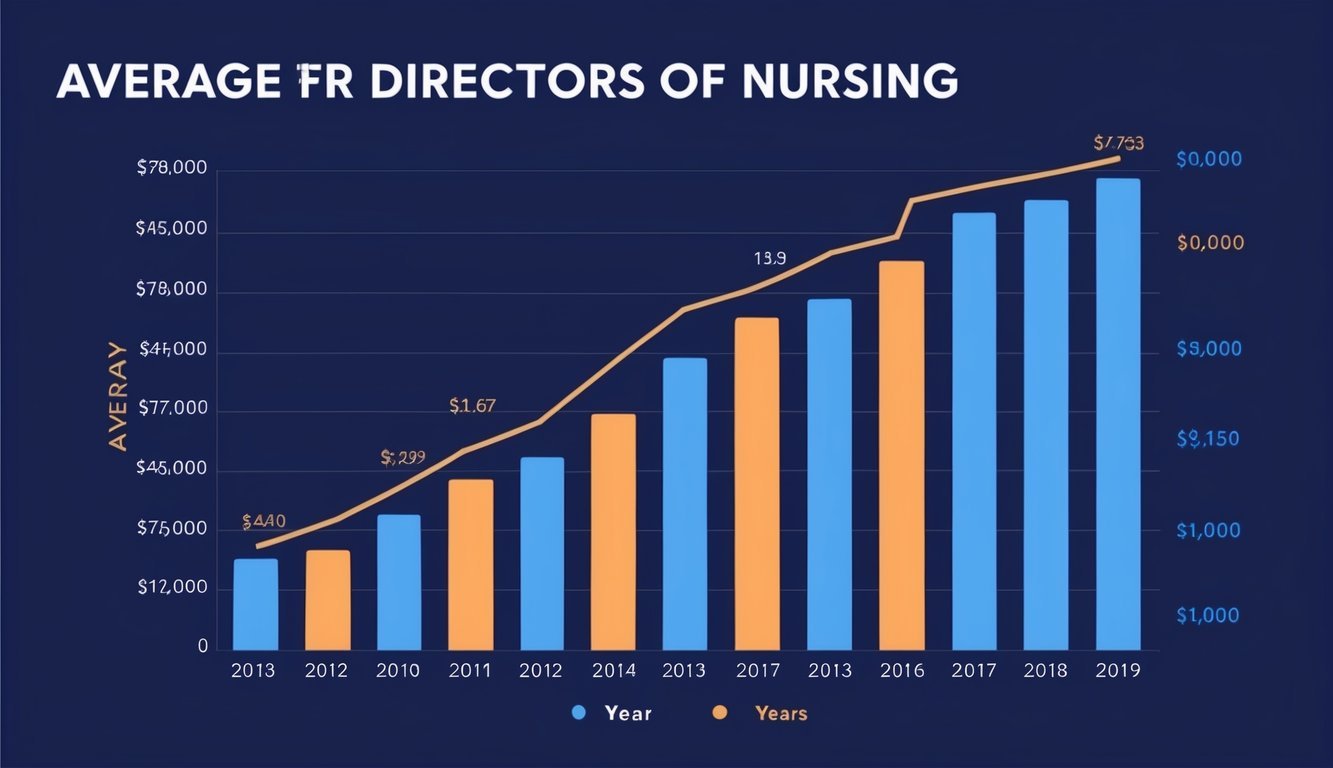Understanding the salary of a Director of Nursing is crucial for anyone considering this important role in healthcare. The average salary for a Director of Nursing in the United States is around $107,000 per year.
Salaries vary by experience, location, and the specific healthcare setting.
This role not only offers a competitive salary but also provides opportunities for advancement and additional benefits.
Various factors influence the salary of a Director of Nursing, including the level of education, years of experience, and the type of healthcare facility.
For example, positions in urban areas or specialized medical centers tend to offer higher pay than those in rural settings.
Knowing these details can help you make informed career decisions and negotiate effectively.
If you’re looking to advance your career or simply want to understand more about the financial aspects of being a Director of Nursing, this blog post provides insights and valuable information to help you on your journey.
Key Takeaways
- The average salary for a Director of Nursing is around $107,000 per year.
- Several factors, such as location and experience, influence salary levels.
- Advancing your education can lead to higher compensation opportunities.
Understanding the Role of a Director of Nursing

The Director of Nursing (DON) plays a critical role in healthcare settings.
You will oversee nursing staff and ensure high-quality patient care.
This position requires a combination of key responsibilities, necessary qualifications, and essential leadership skills to succeed in today’s complex healthcare environment.
Key Responsibilities
As a Director of Nursing, your primary duties include managing nursing operations, staffing, and quality assurance.
You will also develop policies and procedures that align with healthcare regulations.
Additional responsibilities often include:
- Supervising Nursing Staff: You oversee nurse managers and staff, assisting them in daily operations.
- Patient Care Management: Ensuring patient care standards are met is crucial.
- Budget Management: You monitor and manage departmental budgets to optimize resource allocation.
- Training and Development: You are responsible for continuous education and training of your nursing team.
These tasks require a keen understanding of both clinical practices and administrative processes.
Necessary Qualifications
To become a Director of Nursing, specific qualifications are vital.
Most positions require a Bachelor’s Degree in Nursing (BSN) at a minimum.
Many employers prefer candidates with a Master’s Degree in Nursing or Healthcare Administration.
License requirements typically include:
- Active RN License: You must hold a valid Registered Nurse (RN) license.
- Certification: Additional certifications like Certified Nurse Administrator (CNA) can enhance your qualifications.
- Experience: Most roles require a minimum of 5-7 years of nursing experience, with at least 2-3 years in a managerial role.
These qualifications ensure you have the knowledge and expertise to lead effectively in a healthcare environment.
Essential Leadership Skills
Strong leadership is essential for a Director of Nursing.
Skills you should focus on include:
- Communication: Clearly convey information and expectations to your team and patients.
- Decision-Making: You need to make timely and effective decisions about patient care and operations.
- Conflict Resolution: Addressing conflicts among staff or with patients is crucial for maintaining a positive healthcare environment.
- Team Building: Foster a culture of collaboration and support among your nursing staff.
These skills enhance your ability to lead effectively and ensure optimal patient care within the healthcare system.
Factors Influencing Director of Nursing Salaries
Understanding the factors that affect salaries for directors of nursing can help you make informed career decisions.
Key influences include geographic location, experience and education level, as well as the type of healthcare facility.
Geographic Location
Your salary as a director of nursing can vary significantly based on where you work.
Urban areas often offer higher salaries compared to rural locations, mainly due to the higher cost of living.
For example:
| Location Type | Average Salary |
|---|---|
| Urban | $262,390 |
| Suburban | $224,390 |
| Rural | $189,793 |
Salaries can also differ by state.
States with higher demand for healthcare professionals may provide more competitive pay.
Always consider local job markets when evaluating salary offers.
Experience and Education
Your level of experience and education plays a crucial role in determining your salary.
Directors with advanced degrees, such as a Doctor of Nursing Practice (DNP) or Master of Science in Nursing (MSN), typically earn more than those with only a Bachelor of Science in Nursing (BSN).
Average salaries by experience level can be summarized as follows:
| Experience Level | Average Salary |
|---|---|
| Entry-Level (0-5 yrs) | $73,150 |
| Mid-Level (6-10 yrs) | $99,730 |
| Experienced (10+ yrs) | $114,840 |
Additionally, having certifications like Nurse Executive (NE-BC) can enhance your earning potential.
Healthcare Facility Type
The type of healthcare facility where you work can also impact your salary.
Directors of nursing in large hospitals usually earn more than those in small practices or long-term care facilities.
Here’s a look at salary ranges based on facility type:
| Facility Type | Average Salary |
|---|---|
| Large Hospital | $344,157 |
| Small Hospital | $224,390 |
| Long-Term Care Facility | $199,000 |
In these settings, the responsibilities and scope of the role may differ, affecting how compensation is structured.
Understanding these differences can help you target your job search effectively.
Average Salary Data for Directors of Nursing

Directors of nursing earn varying salaries based on experience, location, and the healthcare facility.
Understanding the average salaries can help you better evaluate career opportunities in this field.
National Averages
In the United States, the average annual salary for a Director of Nursing is approximately $167,887 as of October 2024.
This figure can vary, with most salaries ranging between $146,892 and $193,523.
The hourly wage averages around $48.81.
According to Payscale, these figures reflect a 7% increase compared to the average nursing salary.
Salary trends indicate that experienced professionals can earn significantly more, reaching up to $262,390 or more in certain cases.
Websites like Indeed and Salary.com provide additional insights into the average salaries for nursing directors across different settings.
Salary Variations Across States
Salaries for Directors of Nursing vary greatly by state.
For instance, New York offers some of the highest salaries at $179,160 annually.
In contrast, states like South Dakota and Arkansas present lower figures, with averages around $72,000.
This variation often reflects the cost of living in respective areas.
Here’s a table summarizing salaries in various states:
| State | Average Annual Salary |
|---|---|
| New York | $179,160 |
| California | $164,750 |
| Florida | $152,540 |
| Texas | $141,000 |
| South Dakota | $72,000 |
These differences highlight the importance of considering geographic location when assessing job opportunities in nursing leadership.
Additional Compensation Considerations
When evaluating the salary of a Director of Nursing, it’s essential to factor in benefit packages and performance incentives.
These components can significantly impact your overall compensation and job satisfaction.
Benefit Packages
Many employers offer comprehensive benefit packages to attract and retain Directors of Nursing.
Common benefits include:
- Health Insurance: Coverage options typically include medical, dental, and vision plans. It’s crucial to review the premiums and out-of-pocket costs.
- Life Insurance: Employers often provide basic life insurance coverage, with options to purchase additional coverage.
- Retirement Plans: Look for 401(k) or similar plans, often with employer matching contributions to help you save for the future.
- Paid Time Off: Vacation days, sick leave, and holidays can vary widely. Understand your potential days off for work-life balance.
Many organizations, especially in healthcare, may also invest in your professional growth by funding certifications like Certified Director of Nursing.
Performance Incentives
Performance incentives can enhance your earnings beyond the base salary.
Common types include:
- Bonuses: Based on personal or departmental performance metrics, these can significantly boost your income.
- Profit Sharing: Some organizations offer profit-sharing plans where you receive a portion of the company’s profits.
- Certification Bonuses: Additional monetary rewards may be given if you achieve professional certifications, such as becoming a Certified Director of Nursing.
Understanding these incentives can help you negotiate better compensation when starting a new position or during performance reviews.
Advancing Your Career as a Director of Nursing
To excel as a Director of Nursing, focusing on education and networking can significantly enhance your career.
By pursuing further education and engaging with professional organizations, you can improve your skills and open up new opportunities in this critical nursing leadership role.
Further Education and Certifications
Advancing your education is crucial for career growth.
You may want to consider earning a Master of Science in Nursing (MSN).
This degree often leads to higher-paying positions and includes specialized training in management and leadership.
Many programs offer an Online Master of Science in Nursing, making it easier to balance your studies with your work schedule.
Additionally, obtaining further certifications, such as becoming a Certified Director of Nursing through recognized organizations, can elevate your professional standing.
Having your RN License is foundational, but additional certifications can showcase your expertise and commitment.
Focus on certifications that align with your career goals, as these can enhance your qualifications for higher-level positions.
Professional Organizations
Joining professional organizations can provide valuable resources and networking opportunities.
The National Association of Directors of Nursing offers tools that keep you informed about industry trends and regulations.
Being part of such organizations allows you to connect with other nursing leaders and share insights.
The American Association of Post-Acute Care Nursing (AAPACN) is another option that focuses on specific areas within nursing, providing specialized resources and educational programs.
Membership in these organizations often grants access to workshops, conferences, and certification courses that are beneficial for your career development.
Frequently Asked Questions

This section addresses common inquiries about the salary and role of a Director of Nursing.
Understanding these aspects can help you evaluate career options within this important healthcare field.
What are the typical salary ranges for a Director of Nursing in different healthcare settings?
Salaries for Directors of Nursing can vary widely based on the healthcare setting.
For example, in hospitals, the average salary may be higher compared to nursing homes or outpatient clinics.
| Healthcare Setting | Typical Salary Range |
|---|---|
| Hospitals | $106,000 – $156,000 |
| Nursing Homes | $85,000 – $120,000 |
| Outpatient Clinics | $80,000 – $110,000 |
How do geographic locations within the US, like California or Texas, affect a Director of Nursing’s salary?
Geographic location significantly impacts Director of Nursing salaries.
For instance, states like California often offer higher salaries due to the cost of living, while Texas may have a lower average salary.
| State | Average Salary |
|---|---|
| California | $120,000 – $212,000 |
| Texas | $90,000 – $130,000 |
What factors contribute to variations in salary for a Director of Nursing at senior levels?
Several factors contribute to salary differences at senior levels.
These include years of experience, level of education, and the specific healthcare facility’s size and type.
How does the role of a Director of Nursing in a nursing home compare in salary to other healthcare facilities?
Directors of Nursing in nursing homes typically earn less than those in hospitals.
They may enjoy more stable hours but face different challenges related to long-term care.
What is the typical hourly pay for a Director of Nursing, and how does it compare to the annual salary?
The average hourly pay for a Director of Nursing is about $48.54.
This translates to an approximate annual salary of $100,969, though this can vary based on the factors mentioned earlier.
What are the responsibilities and job description of a Director of Nursing?
The Director of Nursing oversees nursing staff, ensures quality patient care, and manages budgets.
You’ll also be involved in staff training and maintaining compliance with healthcare regulations.

